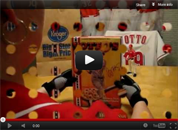Manager Job Description: Part 3 of 5
I love how just talking about the qualities I’d look for in Dusty Bakers’ hypothetical replacement has coincided so nicely with the Reds actually showing up. No doubt improving the line-up so that Orlando Cabrera isn’t seeing most of the ABs and Brandon Phillips can actually get an opportunity to steal now and then has had a positive effect (psychological, if nothing else…my personal psychology in particular), but that can’t explain the pitching suddenly getting better or the concentration problems that were plaguing the team there for a while.
 It’s almost like the team actually did something to improve their conditioning, which segues nicely into my third quality of a successful manager.
It’s almost like the team actually did something to improve their conditioning, which segues nicely into my third quality of a successful manager.
These requirements are generic and are not intended to endorse or condemn any particular candidate. Any resemblance to the opposite of any past idiotic comments by a particular manager is purely coincidental.
Requirement #3: Having a Conditioning Plan
Even professionals who have put in the Malcolm Gladwell 10,000 hours at their craft have to keep their skills–on an off the field–sharp. But when you are that professional and are so close to the situation, it can be easy to lose perspective on what needs work. That why I think that a good manager has to recognize his role as the objective set of eyes to see when Johnny Cueto needs to put in a little PFP.
And frankly, it doesn’t all have to be all work all the time. Speaking from my own experience, I know I’m not made particularly better at my job after working an 80 hour week, and I imagine that an extra three hours of training every day wouldn’t really improve the team either. What I’m saying is whether it’s baserunning practice or a ropes course to get them gellin’, it’s got to be the manager’s responsibility to bring a plan of specific actions to keep the team well-honed.
Interview questions to ask to check for Having a Conditioning Plan:
Question: It’s the end of June and the team is dragging. What would you do to get them going again?
Good answer: We might take an off-day trip to King’s Island and have everyone report to the park two hours early the next day to do some light fundamentals.
Another good answer: My guys never drag because I keep the conditioning constantly fresh and we’re always working on new skills.
Bad answer: If the guys aren’t doing something about it on their own, I don’t know what I could do.
Next time, we’ll look at the importance of the manager’s philosophy being compatible with the GM’s philosophy. No one wants the clashes between a pre-Socratic and a Neoplatonic dragging down the team.


